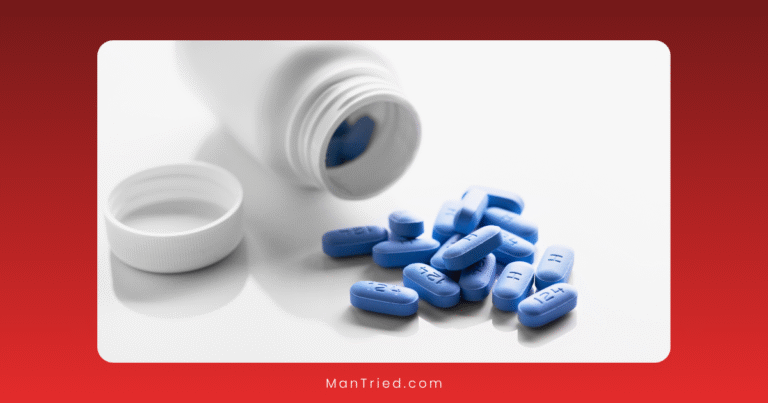Substance Use and Sexual Function: What Young Men Need to Know

When it comes to sexual health, young men often focus on preventing unwanted pregnancies and STIs—important concerns, certainly. However, the impact of alcohol and recreational drugs on sexual function is frequently overlooked, despite its significant effects on sexual performance, satisfaction, and long-term health.
This article explores how common substances affect male sexual function, separating facts from myths and offering practical advice for making informed decisions about substance use and sexual health.
The Rising Concern of Sexual Dysfunction in Young Men
Erectile dysfunction (ED) is no longer just an older man’s issue. Recent studies show concerning trends among younger populations:
- A U.S. cohort study found that 14.2% of young men experience some form of ED, with 11.3% reporting mild symptoms and 2.9% experiencing moderate-to-severe ED
- By 2025, global estimates project that ED will affect 322 million men worldwide
- The prevalence of sexual dysfunction among men in their 20s and early 30s has increased significantly over the past decade
- Approximately 35.4% of young males report at least one sexual dysfunction, including premature ejaculation or erectile difficulties
Dr. Michael Chen, a urologist specializing in men’s sexual health, notes: “We’re seeing more young men in their twenties with erectile issues than ever before. While psychological factors play a significant role, substance use is a major contributor that often goes unaddressed.”
Alcohol: The Most Common Culprit
Among substances that affect sexual function, alcohol remains the most widely used, with approximately 86% of young adults reporting lifetime use.
Short-Term Effects
The relationship between alcohol and sexual function follows a biphasic pattern:
- Low doses may reduce inhibition and anxiety, potentially enhancing desire and confidence
- Moderate to high doses impair physical sexual response through:
- Decreased blood flow to the genital region
- Delayed ejaculation or inability to ejaculate
- Difficulty achieving or maintaining erections
- Reduced sensation and sexual satisfaction
A study by the Center for Drug Use and HIV/HCV Research found that 72% of young adults reported feeling more attracted to others when drinking alcohol, but sexual dysfunction was also commonly reported, especially among males.
Long-Term Effects
Regular heavy drinking can lead to persistent sexual problems:
- Decreased testosterone production
- Testicular atrophy and reduced sperm production
- Chronic erectile dysfunction
- Reduced libido and sexual desire
“What many young men don’t realize is that the ‘whiskey dick’ they experience occasionally can become a permanent condition with habitual heavy drinking,” explains sexual health educator James Williams. “Alcohol affects the endocrine system, potentially leading to hormonal imbalances that impair sexual function even when sober.”
The Post-Sex Regret Factor
Beyond physiological effects, alcohol is associated with the highest rates of post-sex regret—31% compared to 13% for ecstasy and 7% for marijuana. This emotional aftermath can contribute to performance anxiety and psychological barriers to healthy sexual function in future encounters.
Cannabis: Mixed Effects on Sexual Performance
With increasing legalization, cannabis use has grown among young adults, with approximately 59% reporting lifetime use. Its effects on sexual function are complex and dose-dependent.
Potential Benefits at Low Doses
Some research suggests moderate cannabis use may:
- Enhance sensory perception during sex
- Reduce anxiety that might otherwise interfere with performance
- Increase relaxation and body awareness
Risks at Higher Doses or With Regular Use
However, heavy or chronic use is associated with:
- Decreased testosterone levels
- Reduced sperm count and quality
- Erectile difficulties
- Delayed ejaculation
- Decreased motivation for sexual activity
A 2023 study found that men who use marijuana are twice as likely to experience ED compared to non-users. Dr. Sarah Johnson, a reproductive endocrinologist, explains: “THC, the main psychoactive compound in cannabis, can affect the hypothalamic-pituitary-gonadal axis, potentially disrupting hormone production essential for normal sexual function.”
Individual Variation
Cannabis effects vary significantly between individuals based on:
- Strain and THC/CBD content
- Individual metabolism
- Frequency of use
- Concurrent use of other substances
- Setting and psychological state
Stimulants: The Deceptive Enhancement
Stimulants like cocaine and amphetamines are sometimes used to enhance sexual experiences, but their effects often lead to disappointment and health risks.
Cocaine
Despite initial effects that might seem beneficial for sexual performance, cocaine can cause significant sexual dysfunction:
- Initial effects: Increased confidence, heightened arousal, delayed ejaculation
- Subsequent problems:
- Erectile dysfunction (affecting up to 66% of long-term users)
- Difficulty achieving orgasm
- Reduced sexual desire with continued use
- Cardiovascular damage that can permanently affect erectile function
MDMA (Ecstasy)
MDMA produces complex effects on sexual function:
- Positive effects: Increased emotional intimacy, enhanced tactile sensitivity, stronger feelings of connection
- Negative effects:
- Erectile dysfunction in up to 40% of male users
- Delayed ejaculation or inability to ejaculate
- Potential long-term serotonergic damage affecting sexual function
- Dehydration and hyperthermia risks during sexual activity
Research indicates that while 74.5% of ecstasy users report increased body sensitivity, many also experience significant sexual dysfunction, particularly difficulty achieving erection and orgasm.
Amphetamines and Methamphetamine
These powerful stimulants are particularly problematic for sexual health:
- Initial increases in libido and delayed ejaculation
- Severe erectile dysfunction with regular use
- Compulsive sexual behavior that increases STI risk
- Potential permanent damage to dopamine systems involved in sexual pleasure
- Significant risk of addiction and associated sexual health decline
The “Chemsex” Phenomenon
A growing concern is the intentional combination of drugs specifically to enhance sexual experiences, known as “chemsex.” This practice is particularly prevalent among certain communities, with a lifetime prevalence of approximately 16% among gay, bisexual, and other men who have sex with men in Europe.
Chemsex typically involves:
- Polydrug use (combining multiple substances)
- Extended sexual sessions (sometimes lasting days)
- Higher-risk sexual behaviors
- Increased risk of STI transmission
The combination of substances used in chemsex can have synergistic negative effects on sexual function, particularly with regular participation.
Prescription Medications and Sexual Side Effects
Young men should also be aware that certain prescription medications can impact sexual function:
Antidepressants
Many common antidepressants, particularly SSRIs, can cause:
- Delayed ejaculation
- Difficulty achieving orgasm
- Reduced libido
- Erectile difficulties
Hair Loss Treatments
Finasteride (Propecia), used for male pattern baldness, may cause:
- Erectile dysfunction
- Decreased libido
- Ejaculation disorders
- Potential post-treatment sexual dysfunction
Blood Pressure Medications
Some antihypertensives can contribute to erectile dysfunction through various mechanisms.
“If you’re experiencing sexual side effects from prescription medications, never stop taking them without consulting your doctor,” advises Dr. Chen. “Alternative medications or dosage adjustments may help mitigate these effects while still treating your condition.”
The Psychological Component: Anxiety, Performance, and Substance Use
The relationship between substance use and sexual function isn’t purely physiological—psychological factors play a crucial role:
The Performance Anxiety Cycle
Many young men use substances to reduce performance anxiety, creating a problematic cycle:
- Experience performance anxiety about sexual encounters
- Use substances to reduce anxiety
- Experience substance-induced sexual dysfunction
- Develop increased anxiety about future performance
- Become dependent on substances to manage anxiety
- Experience worsening sexual function
Mental Health Connections
Research has identified poor mental health and depression as predictive factors for both premature ejaculation and erectile dysfunction in young men. Substance use as self-medication for these conditions can exacerbate sexual difficulties rather than relieve them.
Risk Factors and Vulnerable Populations
Certain factors increase the likelihood of experiencing substance-related sexual dysfunction:
Individual Risk Factors
- Family history of addiction or sexual dysfunction
- Pre-existing mental health conditions
- Early onset of substance use
- History of sexual trauma or abuse
- Poor cardiovascular health
Behavioral Risk Patterns
- Combining multiple substances
- Using substances specifically to enhance sexual performance
- Relying on substances to initiate sexual encounters
- Using substances to cope with sexual anxiety or dissatisfaction
Prevention and Harm Reduction Strategies
For young men concerned about maintaining optimal sexual function while navigating social situations where substances are present, consider these approaches:
Moderation Strategies for Alcohol
- Set limits before social situations (e.g., 2-drink maximum)
- Alternate alcoholic beverages with water
- Avoid drinking to intoxication before anticipated sexual activity
- Allow sufficient time between drinking and sexual activity
- Consider abstaining from alcohol if sexual dysfunction becomes recurrent
Cannabis Considerations
- If using cannabis, opt for lower-THC strains
- Be aware of dosage and timing relative to sexual activity
- Recognize individual sensitivity and adjust accordingly
- Consider CBD-dominant products if anxiety reduction is the goal
General Harm Reduction
- Avoid mixing substances, which can have unpredictable effects
- Stay hydrated, particularly when using alcohol or MDMA
- Be cautious with new substances or unfamiliar sources
- Communicate with partners about substance use and potential effects
When to Seek Help
Knowing when to consult a healthcare provider is essential for addressing substance-related sexual dysfunction effectively.
Warning Signs
Consider seeking professional guidance if:
- Sexual dysfunction persists even when not using substances
- You feel dependent on substances to engage in sexual activity
- Sexual problems are causing significant distress or relationship issues
- You’re unable to reduce substance use despite negative sexual effects
- You experience other health problems related to substance use
Treatment Options
Various approaches can help address substance-related sexual dysfunction:
- Substance use counseling or addiction treatment when necessary
- Sexual health therapy to address psychological components
- Medical evaluation to rule out other causes of sexual dysfunction
- Lifestyle modifications to improve overall and sexual health
- Couples counseling when relationship factors contribute to the issue
Lifestyle Factors That Support Sexual Function
Beyond substance management, several lifestyle factors can significantly improve sexual health:
Physical Activity
Regular exercise improves sexual function through multiple mechanisms:
- Enhanced cardiovascular health and blood flow
- Increased testosterone production
- Improved body image and confidence
- Stress reduction and mood enhancement
Research indicates that just 30 minutes of daily walking can reduce the risk of erectile dysfunction by 41%.
Nutrition
Dietary choices significantly impact sexual health:
- Mediterranean diet components improve erectile function
- Foods rich in flavonoids (berries, citrus, dark chocolate) reduce ED risk
- Adequate zinc (found in oysters, meat, legumes) supports testosterone production
- Limiting processed foods improves vascular health
Sleep Quality
Poor sleep is linked to sexual dysfunction through:
- Reduced testosterone production
- Increased stress hormones
- Fatigue affecting desire and performance
- Mood disturbances that impact sexual interest
Aim for 7-9 hours of quality sleep to support optimal sexual function.
The Future of Male Sexual Health
As awareness of sexual health issues in young men continues to grow, several promising developments are emerging:
- Improved diagnostic approaches for identifying the causes of ED in young men
- Greater recognition of the role substances play in sexual dysfunction
- Reduced stigma around discussing male sexual health concerns
- Integration of sexual health screening into routine healthcare for young men
- Development of targeted interventions for substance-related sexual dysfunction
Conclusion: Informed Choices for Long-Term Sexual Health
Understanding how substances affect sexual function empowers young men to make informed decisions that balance social and recreational choices with sexual health goals. While occasional moderate substance use may not cause lasting problems for most individuals, recognizing the potential impacts—both immediate and long-term—is essential for maintaining sexual wellness.
Dr. Chen emphasizes: “The choices young men make now regarding substance use can affect their sexual health for decades to come. Being informed isn’t about abstaining from everything, but rather understanding the risks and making conscious decisions that align with your priorities for sexual wellness.”
By prioritizing education, moderation, and open communication with healthcare providers and partners, young men can navigate the complex relationship between substance use and sexual function more effectively, setting the foundation for lifelong sexual health.
Have you noticed effects of substances on your sexual function? Share your experiences or questions in the comments below.






